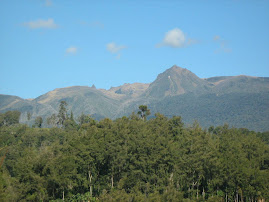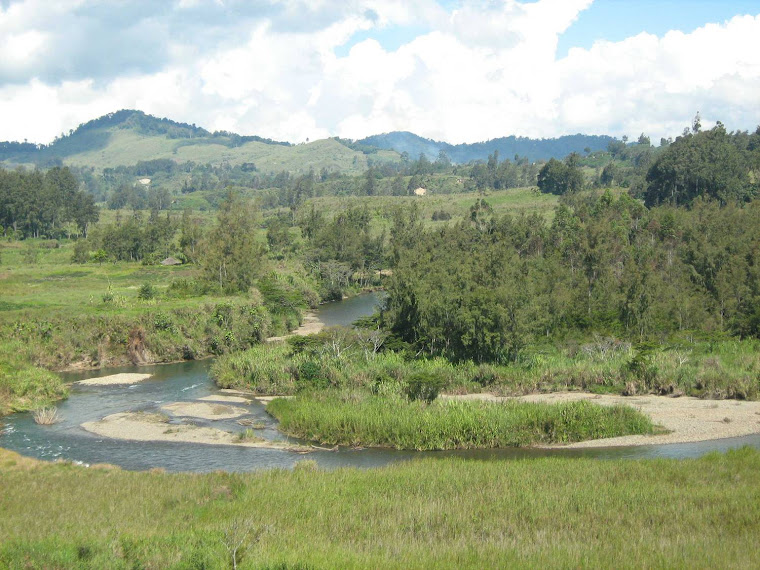Will USA still "re-engage" in Oceania?
By Mathew Yakai, Changchun, China
UNITED State’s “re-engagement” policy announced by the replaced U.S president, George W. Bush declaring “2007 the year of the pacific” did not generate substantial theoretical debate in the Pacific on potential rivalry amongst the regional powers.
This poses several questions. the policy makers are either ignorant of the issue given their respective limited historical knowledge on power politics amongst nation states or they are optimistic that Pacific’s sovereignty will be respected though multinational companies and individuals can directly influence any countries.
Previously, this column was skeptical of Washington’s “2007 year of the pacific”, part of U.S.A.’s “re-engagement” policy after leaving the region following the collapse of former USSR.
Given that US now have a new president soon, one must ask whether the “re-engagement” policy will be carried on, and in what capacity, or if it would be abandoned then on what grounds.
According to Congressional Research Service report for American Congress published July 6, 2007, China made its way into the region with its embassies or missions established in most of the 14 island states after U.S. closed down most of her embassies, withdrew USAID, and suspended its renowned Fulbright Scholarship after the Cold War.
The report, which was the outcome of the Pacific Islands leaders in Washington prompted USA to “re-engage” on issues such as expanding U.S. public diplomacy efforts and foreign aid activities, strengthening U.S.-Pacific trade and preferential trade, address global warming and other environmental concerns in the region and enhancing educational and cultural exchanges.
According to the report, some analysts argue that addressing these issues would not only help promote political stability and economic development but also enhances U.S. security interests and counter possible adverse effects of China’s growing influence in the region.
Whether these analysts are correct or not, the important issue for Pacific island leaders is that, the role of Obama in “re-engaging” in the region must not “contain” China’s intention to share its wealth and economic growth, not only in the region but other third world countries which were once abandoned by U.S. and other colonial powers.
Stewart Patrick, a research fellow at the Centre for Global Development in Washington observes that the gravest dangers to U.S. and the world security are no longer military threats from great powers but rather transnational threats emanating from the worlds poorly governed countries.
He alleges that poorly performing developing countries are linked to humanitarian catastrophes, mass migration, environmental degradation, regional instability, energy insecurity, global pandemics, international crime, the proliferation of weapons of mass destruction (WMD) and transnational terrorism.
Leading thinkers such as Francis Fukuyama have said that, “since the end of Cold War, weak and failing states have arguably become the single most important problem for international order.”
Official Washington agrees. Secretary of State Condoleezza Rice declares that nations incapable of exercising “responsible sovereignty” have a “spillover effect” in the form of terrorism, weapons proliferation and other dangers.
This new preoccupation with weak states is not limited to the U.S. In the United Kingdom (U.K.), the Prime Minister’s Strategy Unit has advocated a government-wide approach to stabilizing fragile countries. Canada and Australia are following suit.
Australian Think Tanks have labeled Papua New Guinea (PNG) as heading towards the “brink of collapse” that attracted immediate attention from Canberra while in Solomon Islands, Australia and New Zealand led mission are stationed to normalize the 2006 riot allegedly targeting Chinese communities.
U.S., U.K, Australia, New Zealand (N.Z.) and Japan are traditional powers in the pacific with respective dominance. France included. And they are strong allies till today fighting common enemies from humanity to environment, even ideology.
But their ratings in the world do not seem appealing. Carol Bellamy and Adam Weinberg of World Learning discovered that U.S.’s image in the world has diminished, including its allies.
According to them, a June 2007 study by the Pew Foundation documented negative perception of the U.S. in just above every part of the globe.
Over the last five years, the percentage of people with a favorable image of the U.S. decreased by 11% in Japan, 18 % in Argentina, 30% in Germany and 32% in Indonesia. Even in U.K, the number of people with favorable U.S. views is a meager 51%.
The cause of these changes and the debt of the feelings are complex and open to debate. What is clear, however, is the need to deal with the perception problem, thus, reputation matters.
However, Wu Xinbo, a professor at the Center for American Studies at Fudan University in China see U.S. with full of contradiction.
Wu see the 20th century passed with Great America’s Way, but as the world move into the 21st century, the magic of globalization and the information age has rendered U.S. influence omnipresent on the earth.
He argues that the U.S. primary role in the world affairs is understood, but for many observers, it is full of contradictions.
“The U.S. pledges to stand for human rights and democracy but these promises are coupled with certain degree of hypocrisy. The U.S. claims to promote peace and stability but often intrudes into the internal affairs of others by abusing its supreme military power or waving the stick of sanctions.” Wu commented.
The U.S. cherishes a high degree of self-pride but often neglects to show respect to others, and consideration for the national feelings of others. Washington tends to seek absolute security for itself but is inclined to dismiss the legitimate security concerns of other countries.
U.S. preaches about environmental pollution and sea rise but is the greater polluter of planet earth, and never rectified the Kyoto Protocol.
So should the pacific region question the reasons behind U.S.’s “re-engagement” in the region, if Obama carry on? This is because in the pacific, there are no threats directed to U.S. as it alleged with Iraq, Afghanistan, North Korea and Iran.
Pacific has always been peaceful with all administrations of governments functioning well with public servants still being paid their salary on time.
Fiji’s Bainimarama and his coup led government have proven to function well though there have been threats from Canberra, Washington, and Wellington.
Given these, this commentary concludes that U.S.’s main reasons for ‘re-engaging” in the region is because of China’s already presence with the notion of “China threat”.
If “Containment” is the policy U.S. will attempt, then it is caused not by the “China threat” theory but simply because U.S. is yet to understand the 5000 years old Middle Kingdom.
In fact, understanding China has never been that simple.
China has made huge progress over the past three decades towards turning itself into a modern country.
Although China’s rise has never come close to the level of global power of the U.S. or that of Great Britain during the 19th century, its rapidly growing economy, political and cultural engagement and influence around the world today is as understandable as it is remarkable.
China has emerged as an engine of global economic growth, with US$1.8 trillion in foreign currency reserves in May 2008 and plans to apply hundreds of billions of dollars of this to international investment in coming years through wealth fund.
It drives needs for all kinds of commodities, from oil and aluminum to cement and copper, that has driven up world price.
China is the world’s largest trader in terms of volume with GDP rising to US$3.24 trillion in 2007 and GDP growth in 2007 reaching just under 12%.
It has risen rapidly to become the largest trading partner of many nations particularly in Asia.
China has also become an important and active player in critical global security issues ranging from North Korea, Iran and Sudan to global warming, HIV/Aids, and energy security.
Its officials and scholars have become more open to discussing China’s evolving perspectives and on going internal debates about a full range of international issues.
In the process, Beijing has displayed increasing self-confidence and assertiveness in publicity promoting its interest and principles.
Perhaps most important, the worlds perception of China’s power and importance internationally today, and ever-growing influence year by year, has evolved measurable.
It is now commonly stated that no major international challenge can be effectively be met without China’s assistance.
In short, China’s “rise” has become sooner then expected and is here to stay in the region.
Thus, USA’s “re-engagement” policy, if the new president will still implement then China must be a developmental partner, not a rivalry in the pacific, once U.S.A’s water back.
The Pacific Islanders can benefit from both China and U.S.A. if islanders play their island politics safely for common benefit.









